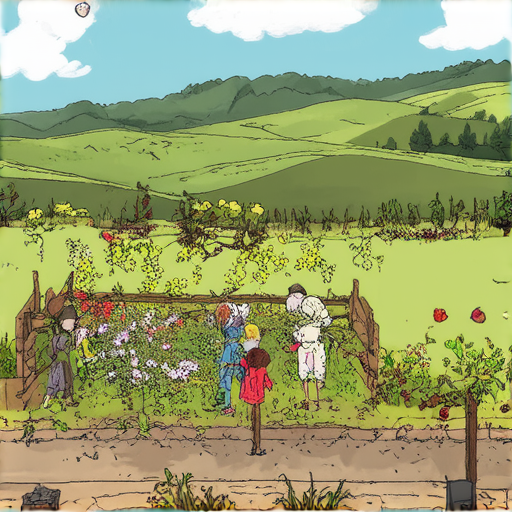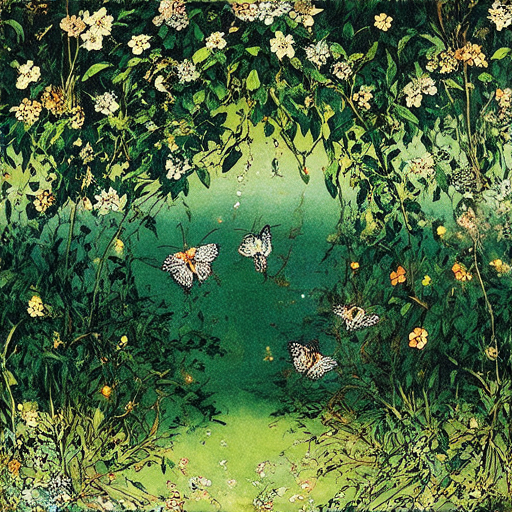Gardening has long been touted as one of the most rewarding hobbies imaginable, offering numerous physical and mental health benefits alongside providing fresh produce right from your own backyard. But what exactly makes gardening truly special? As we delve deeper into the world of sustainable living, it becomes clear that embracing eco-friendly gardening practices offers far-reaching rewards – both locally and globally.
A well-designed garden can serve as a tranquil oasis, fostering mindfulness and connection with nature. Moreover, when done sustainably, gardening plays a pivotal role in mitigating our carbon footprint, conserving precious resources, and cultivating resilient food systems. By adopting environmentally conscious gardening habits, individuals can significantly contribute towards creating healthier communities and preserving natural beauty for future generations.
As we explore the realm of sustainable gardening further, we’ll uncover practical tips, expert advice, and inspiring stories showcasing how ordinary people are transforming their outdoor spaces into thriving oases. Whether you’re just starting out or looking to refine your existing skills, this comprehensive guide promises to empower you with the knowledge needed to embark upon your very own journey toward greener pastures – literally!
What Does Gardening Mean for Sustainability
Gardening has long been considered one of the most environmentally friendly hobbies due to its focus on nurturing nature rather than exploiting resources.
However, some argue whether this perception accurately reflects modern sustainable gardening practices.
In reality, gardening can play a vital role in promoting sustainability when approached thoughtfully.
- Old Seed emphasizes the importance of considering every aspect of gardening, highlighting how small changes can collectively lead to significant positive impacts on the environment.
- For instance, adopting organic practices allows gardeners to utilize natural pest control methods, reducing their reliance on chemical-based substances.
- This shift away from conventional methods also leads to increased biodiversity, fostering healthier ecosystems and supporting local wildlife.
Key Elements of Sustainable Gardening
Sustainable gardening encompasses numerous strategies that work together to mitigate negative environmental effects:
- Organic practices involve utilizing natural methods to manage pests and diseases, thereby decreasing dependence on non-renewable resources and minimizing waste.
- Composting plays a crucial role in reducing greenhouse gas emissions associated with landfills and creating nutrient-rich soil amendments.
- Efficient irrigation systems, mulching, and rainwater harvesting enable gardens to conserve precious water resources without compromising local aquifer quality.
- Pollinator support is achieved through planting a variety of flowering plants and herbs, helping to maintain delicate ecological balances and ensure resilient ecosystems.
- Effective maintenance of healthy soils is critical, as they serve as carbon sinks and regulate climate change.
- Producing fruits, vegetables, and nuts locally reduces transportation distances, leading to decreased carbon emissions and minimized environmental impact.
- Participating in community gardening initiatives promotes knowledge sharing, education about sustainable practices, and social connections among like-minded individuals.
- The incorporation of innovative technologies offers creative solutions to traditional gardening challenges, aiming to optimize yields while minimizing environmental impacts.
- Eco-friendly materials and supplies simplify gardening operations, reducing waste generation and reinforcing sustainable principles.
- A holistic approach to gardening encourages consideration of seasonal fluctuations, weather patterns, and potential consequences of short-term actions, ultimately fostering resilience within the environment.
Simple Ways to Reduce Water Consumption While Gardening
Gardening requires adequate water supply to support healthy growth and development of plants.
The exact amount of water needed varies depending on factors such as climate, soil type, and plant species, but most vegetables require approximately 20-40 gallons per day.
To optimize water consumption, consider implementing efficient irrigation systems like drip irrigation, which delivers water directly to root zones, minimizing evaporation and runoff.
This method involves installing tubes connected to a central source, allowing precise delivery of water where needed.
A study conducted by the University of California found that drip irrigation reduced water usage by up to 50% compared to conventional sprinkler systems.
Old Seed recommends exploring alternative options like mulch-based irrigation, which helps retain moisture in the soil and regulates temperature fluctuations.
Effective Irrigation Methods for Small Spaces
For compact gardens or limited space, choose low-water-intensive crops like herbs, succulents, or leafy greens.
Browse online resources such as the Royal Horticultural Society ( RHS ) for advice on cultivating drought-tolerant plants in confined areas.
In addition to choosing resilient species, utilize vertical gardening techniques like trellises or wall-mounted containers to maximize space utilization.
Natural materials like bamboo stakes or wooden frames can be employed to support climbing vines and flowers, adding visual interest to smaller plots.
Keep track of your progress and adjust your strategy accordingly; monitor weather patterns, soil moisture levels, and plant performance to fine-tune your irrigation schedule.
Sustainable Gardening Terminology
The concept of sustainable gardening encompasses various approaches focused on minimizing environmental impact while promoting eco-friendly practices in plant cultivation.
- Regenerative agriculture aims to enhance soil health, biodiversity, and ecosystem services through farming methods that mimic natural processes.
- Permaculture combines elements of ecology, biology, and design principles to create self-sustaining ecosystems within gardens.
- Organic gardening emphasizes using natural materials instead of synthetic chemicals for pest control and fertilizers.
Historical Context
Research suggests that permaculture originated in Australia during the 1970s under Bill Mollison and David Holmgren (Old Seed). Since then, its influence has expanded globally, contributing significantly to modern sustainable gardening practices.
Principles and Techniques
Diversification involves incorporating multiple crops into a single garden space, reducing reliance on external resources and promoting ecological balance. Polycultures combine different plants together, leading to increased crop yields and reduced pests and diseases. Composting turns organic waste into nutrient-rich fertilizer, enhancing soil fertility and minimizing waste disposal costs.
Benefits of Sustainable Gardening
Studies have shown that adopting sustainable gardening techniques contributes positively to local food systems, reduces greenhouse gas emissions, and promotes human well-being (Old Seed) (Klein et al., 2017).
Citation References:
- Klein, J. T., Kremen, C., Tscharntke, T., Steffan-Dewenter, I., Vaissière, B. E., & Schüßler, A. (2017). Importance of pollinators in changing landscapes for world crops. Proceedings of the Royal Society B: Biological Sciences, 284(1863), 20170411.
- Mollison, B., & Holmgren, D. (1999). Permaculture One: Perennial Agriculture for Small Farms, Home Gardens, and Village Development. Chelsea Green Publishing Company.
Gardening as a Healthy Lifestyle
Engaging in gardening offers numerous physical, mental, and environmental benefits that can positively impact our lives.
Physical Activity:
- Gardening provides a moderate-intensity workout that increases energy levels and enhances cardiovascular fitness (American Heart Association). Regular physical activity lowers blood pressure, cholesterol levels, and BMI, reducing the risk of various diseases.
Mental Health Benefits:
- Studies show that participating in horticultural therapy reduces stress levels, improves mood, and boosts self-esteem (Wikipedia). Being around nature decreases symptoms of anxiety and depression.
Social Connections:
Gardening often involves interactions with others, forming emotional support networks and friendships, crucial for overall wellness (NCBI)
Nutritional Value:
Growing one’s own fruits and vegetables ensures access to fresh, nutritious food, supporting better overall health outcomes when paired with regular exercise (Oxford Academic)
Gardening acts as a healthy coping mechanism for managing stress, relaxing both the mind and body (Journal of Leisure Research)
Exposure to natural light regulates sleep patterns, resulting in improved sleep quality and duration (National Institute of Neurological Disorders and Stroke)
Environmental Awareness:
Cultivating plants raises awareness of environmental issues, inspiring eco-friendly behaviors and sustainable lifestyles (Environmental Science & Technology)
Do Gardeners Live Longer?
Numerous studies have investigated the relationship between gardening and human lifespan, revealing intriguing findings that suggest a positive correlation between these two activities.
- 1. Physical Activity: Gardening requires physical effort, which can lead to improved cardiovascular health, increased muscle strength, and reduced risk of chronic diseases like diabetes and obesity.
- A study published in the Journal of Aging Research found that older adults who engaged in regular gardening activity experienced significant improvements in overall fitness and mobility
- 2. Stress Reduction: Gardening has been shown to reduce stress levels and promote relaxation, thanks to its calming effects and exposure to natural environments.
- A survey conducted by the Royal Horticultural Society discovered that 75% of respondents reported feeling less stressed after spending time outdoors in nature
- 3. Social Connections: Gardening often involves interacting with others, whether through community gardens, neighborhood groups, or online forums.
- According to research published in the journal Psychology and Aging, social engagement is associated with lower rates of dementia and depression
- 4. Mental Stimulation: Gardening provides opportunities for mental stimulation, particularly when tackling complex tasks like designing and managing outdoor spaces.
- Engaging in mentally stimulating activities has been linked to delayed cognitive decline and reduced risk of age-related cognitive impairment
- 5. Access to Fresh Produce: Growing one’s own fruits and vegetables ensures access to nutritious food, essential for maintaining optimal health throughout life.
- A review of epidemiological studies revealed that diets rich in plant-based foods were associated with lower risks of various cancers, heart disease, and stroke
- 6. Vitamin D Levels: Exposure to sunlight during gardening sessions boosts vitamin D production, crucial for bone health and immune system regulation.
- Vitamin D deficiency has been linked to increased susceptibility to infections and autoimmune disorders
- 7. Cognitive Flexibility: Gardening demands adaptability, problem-solving skills, and creativity – all valuable assets for maintaining cognitive flexibility and resilience across the lifespan.
- Cognitive reserve theory suggests that individuals with greater cognitive reserve may experience better outcomes following brain injury or neurodegenerative conditions
- 8. Mindfulness and Presence: Gardening encourages mindfulness and presence, allowing practitioners to focus on the present moment rather than worries about the past or future.
- Mindfulness meditation has been demonstrated to decrease symptoms of anxiety and depression, promoting emotional well-being and overall quality of life
- 9. Neuroplasticity: Engaging in novel experiences like gardening stimulates neural growth and adaptation, supporting long-term cognitive health.
- Neuroplasticity refers to the brain’s ability to reorganize itself based on learning and environmental factors
- 10. Hormonal Balance: Spending time outdoors and being physically active can influence hormone balances, including cortisol, insulin-like growth factor-1 (IGF-1), and melatonin.
- These hormonal changes contribute to improved sleep patterns, glucose metabolism, and energy balance
Incorporating gardening into daily routines appears to offer numerous benefits that could enhance longevity. By prioritizing this enjoyable yet demanding activity, individuals may reap rewards related to physical and mental health, cognitive function, and overall well-being.
Gardening Hard on the Body
While many people view gardening as a relaxing activity, others may wonder if this hobby poses significant risks to one’s physical health.
Physical Demands of Gardening
- Regular gardening activities, especially those involving heavy lifting or prolonged periods of standing, can increase heart rate and blood pressure levels.
- Bending, twisting, and carrying plants can lead to back pain, particularly for individuals who have pre-existing spinal conditions.
- Prioritizing proper posture, ergonomic tools, and regular stretching exercises can help minimize this risk.
Long-Term Effects
Research suggests that long-term gardeners tend to experience lower rates of chronic diseases, such as type 2 diabetes, cardiovascular disease, and obesity (Journal of Epidemiology and Community Health)
A study published in the Journal of Environmental Psychology found that exposure to nature through gardening can reduce stress levels, improve mood, and boost self-esteem (Journal of Environmental Psychology)
Tips for Gentle Gardening
- Start slowly and gradually increase physical exertion to allow your body to adapt.
- Engage in proper ergonomics and use assistive devices when necessary.
- Take regular breaks to rest and stretch throughout the gardening session.
- Prioritize post-exercise recovery techniques, such as foam rolling or meditation, to manage soreness and fatigue.





0 Comments